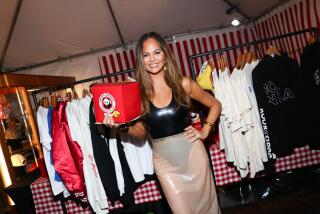Talking turkey is paying off at Carl’s Jr.
- Share via
The company that owns the Carl’s Jr. and Hardee’s fast-food chains is getting more healthy -- and a little less skanky.
Stung by more than two years of dipping sales at the Carl’s Jr. restaurants, and with its target audience of young men disproportionately suffering from unemployment, CKE Restaurants Inc. is trying to expand its appeal.
It’s a change in direction that may be starting to pay off.
Led largely by the popularity of turkey burgers -- a product that would have been heresy at Carl’s Jr. in past years -- sales have been increasing at those restaurants, the company said Tuesday. And in a break from the past, near-naked women are nowhere to be found in the company’s latest ad campaign for a chicken sandwich -- instead, it stars a robot.
“The way we’ve been able to grow business in this recession is taking it from other companies,” said CKE President Andy Puzder. And that has meant offending fewer women and offering more choices for those who aren’t looking for a foot-long cheeseburger.
“The turkey burgers are bringing in healthy-conscious people who probably wouldn’t have come to Carl’s before,” Puzder said. “And it helps with what we call the ‘girlfriend effect.’ ”
Sales at Carl’s Jr. restaurants ticked up only a modest 2.1% during the quarter ended May 23, but it was the first increase after nine straight quarters of declines, the company said. The Hardee’s chain has been doing better, with same-store sales up 9.6% for the quarter.
Last year, same-store sales at Carl’s Jr. were down 6.1% during the same period last year, and at Hardee’s they were down 1.2%.
Revenue overall, however, was down for the quarter, a dip the company attributed to the sale of a distribution subsidiary. CKE brought in $400.6 million for the three-month period, down 8% from the year before. All told, the company lost $2.6 million, slightly less than the $3.1 million it lost during the same period a year earlier.
The company is private -- it was acquired a year ago by Apollo Management, based in Cleveland -- but CKE reported earnings because it has publically traded debt.
Being privately held, Puzder said, has made it easier to make changes at the two chains.
In addition to trying to broaden the company’s appeal, Puzder is expanding the chains. CKE plans to open 300 new Carl’s Jr. locations in Texas over the next several years, and is doubling its overseas presence to 700 locations.
Puzder said the turkey burger, developed in consultation with Men’s Health magazine, was meant to be indulgent as well as more healthful. He credited it with nudging sales at Carl’s Jr. into positive territory. He said the Hardee’s locations are doing better, overall, than the Carl’s Jr. outlets because they are in parts of the country that are having a stronger economic recovery than California, where Carl’s Jr. is heavily concentrated.
Bonnie Riggs, restaurant industry analyst for the NPD Group, said it makes sense for Carl’s Jr. and Hardee’s to try to expand their appeal beyond young men. “The days of targeting one group and putting all your eggs in one basket, like 18- to 24-year-old male super-fans, are over,” Riggs said. “You really have to diversify.”
That’s particularly important in California where customers are generally more health-conscious and looking for alternatives to big, drippy burgers.
But Puzder is walking a fine line because the company doesn’t want to lose its core audience. A standup poster in its stores advertising the turkey burger does indeed include a bikini-clad model, identified as Miss Turkey from the Miss Universe contest.
David Angelo, chairman of the David & Goliath advertising agency that handles CKE, said the company will continue to put beautiful models in its ads. But he said they won’t be stuck into commercials unless they have a reason for being there. Like Miss Turkey.
David & Goliath took over the CKE account this year from Mendelsohn Zien, which was famous for designing the chain’s sexually tinged spots featuring celebrity models such as Kim Kardashian and Paris Hilton. “Today’s consumer is much more wary of brands that try to just sell them,” Angelo said. “They can see through the b.s.”
An ad his company designed features a robot that comes wearily home from work, eager to try one of the new chicken sandwiches. But because it’s a machine, it can’t eat it. The tagline emphasizes the handmade nature of the sandwich and pokes fun at the industrialized production of most fast food: “Machines can’t eat it, so machines shouldn’t make it.”
USC marketing professor Ira Kalb said the ad is effective because it leaves the viewer with a strong message that the sandwich is handmade, and therefore potentially fresher and tastier. It’s smart, he said, because the ad is likely to be perceived as clever by young men while also reaching out to others.
“I don’t think they’re going to lose the original audience,” he said. “I think people know what Carl’s Jr. is. But they’re trying to widen out their target audience.”
--
More to Read
Eat your way across L.A.
Get our weekly Tasting Notes newsletter for reviews, news and more.
You may occasionally receive promotional content from the Los Angeles Times.










